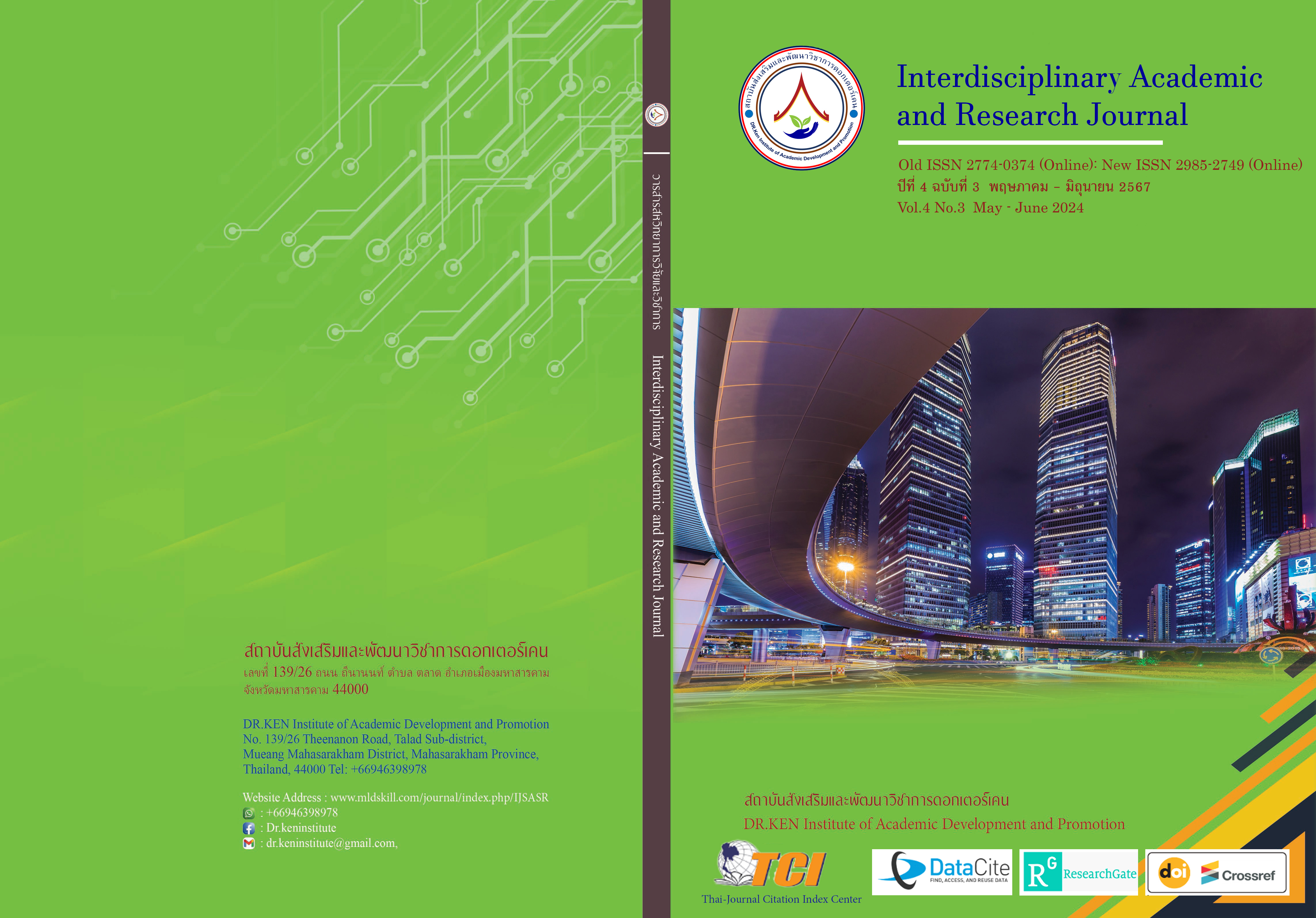The Results of Using Board Games in Learning Instruction Based on Gamification in Vocabulary Topic the Traveling by Plane to Improve English Vocabulary Retention Ability of Vocational Certificate Students
DOI:
https://doi.org/10.60027/iarj.2024.275088Keywords:
Game board; , Gamification; , Ability to Remember; , Subdistrict Administrative OrganizationAbstract
Background and Aims: Organizing learning activities that give students motivation to learn vocabulary should be learner-focused teaching, allowing students to play a role in participating in the learning process, teachers have to find teaching materials that are consistent with learning management to lead to their goals. Therefore, this study has the following objective; (1) To create and find efficiency in using board games with learning activities along the lines of gamification on traveling by plane to develop the ability to remember English vocabulary for students at the vocational certificate level to have efficiency according to the 80/80 criteria. And (2) To study the results of developing the ability of students at the vocational certificate level to memorize English vocabulary after studying by using board games together with learning activities according to gamification on traveling by plane by comparing with the 80 percent criteria or not?
Methodology: The sample was the 3rd year vocational certificate students, tourism majors, Nakhon Lampang Technical College, studying in the academic year 2023, 1 room, a total of 5 people, obtained by purposive selection. The tools used in the research include (1) Two learning management plans based on gamification along with board games. (2) Test about traveling by plane lesson. (3) English vocabulary recognition ability assessment form. (4) Board games. Statistics used for analysis are percentage, mean, standard deviation, and t-test statistics.
Results: (1) Creating and finding the efficiency of using board games in conjunction with learning activities according to gamification on traveling by plane for developing the ability to remember English vocabulary for 3rd-year vocational certificate students in the tourism industry category (E1/E2), it was found that the field test of 5 students had a value equal to 82.67/83.00. (2) Third-year vocational certificate students in the tourism industry category who use board games in conjunction with learning activities according to gamification regarding air travel can remember English vocabulary after studying is higher than the 80% threshold, with statistical significance at the 0.01 level.
Conclusion: Using board games together with learning activities based on gamification promotes English vocabulary learning among vocational certificate students. Their scores during study and after study are quite high. This results in the efficiency of the board game being high as well, as evidenced by the average score of English vocabulary recognition ability after studying being higher than the specified criteria.
References
เนติยา บูรพาศิริวัฒน์. (2565). ผลการจัดการเรียนการสอนโดยใช้กลยุทธ์เกมมิฟิเคชันร่วมกับการเรียนโดยใช้ทีมเป็นฐานที่มีต่อความสามารถในการอ่านภาษาเกาหลีของนิสิตวิชาเอกเกาหลี. วารสารศึกษาศาสตร์ มหาวิทยาลัยบูรพา, 33(3), 39-51.
เบญจภัค จงหมื่นไวย์, และคณะ. (2561). เกมมิฟิเคชันเพื่อการเรียนรู้. วารสารโครงงานวิทยาการคอมพิวเตอร์และเทคโนโลยีสารสนเทศ, 4(2), 34-43.
กระทรวงศึกษาธิการ. (2562). หลักสูตรประกาศนียบัตรวิชาชีพ พุทธศักราช 2562. กรุงเทพฯ : สำนักงานคณะกรรมการอาชีวศึกษา.
กฤษณพงศ์ เลิศบำรุงชัย. (2560). เกมิฟิเคชั่นโลกแห่งการเรียนรู้ที่ขับเคลื่อนด้วยเกม. Retrieved 20 December 2023 from: https://touchpoint.in.th/gamification/.
กิตติชัย สุธาสิโนบล. (2559). การเรียนรู้อย่างมีชีวิตชีวา. สารานุกรมศึกษาศาสตร์ คณะศึกษาศาสตร์ มหาวิทยาลัยศรีนครินทรวิโรฒ., 97-102.
ชลธิชา คำกองแก้ว และ กานต์รวี บุษยานนท์. (2563). การออกแบบบอร์ดเกมการศึกษา “My Hospital”เพื่อพัฒนาผลสัมฤทธิ์ทางการเรียนเรื่องระบบอวัยวะสาหรับนักเรียนชั้นมัธยมศึกษาปีที่ 5 โรงเรียนบดินทรเดชา (สิงห์ สิงหเสนี). การประชุมชาการระดับชาติ "การศึกษาเพื่อพัฒนาการเรียนรู้" ครั้งที่ 4 ประจำปี 2563, วันที่ 5 มิถุนายน 2563 ณ มหาวิทยาลัยราชภัฎสวนสุนันทา: กรุงเทพมหานคร.
ญาณิศา สู่ทรงดี และ คณะ. (2566). การจัดการเรียนรู้ภาษาอังกฤษแห่งศตวรรษที่ 21. วารสารมนุษยศาสตร์และสังคมศาสตร์ มหาวิทยาลัยราชภัฏสุรินทร์. 25(1), 273-291.
ณัฐดนัย อินทรสมใจ และ ทำรงลักษณ เอื้อนครินทร. (2564). การใชเกมคําศัพทภาษาอังกฤษเพื่อพัฒนาความสามารถในการสะกดคําและจดจําคําศัพท์ของนักเรียนชั้นมัธยมศึกษาปที่ 3. วิทยานิพนธ์ปริญญาการศึกษามหาบัณฑิต: มหาวิทยาลัยนเรศวร.
สฤณี อาชวานันทกุล. (2564). Board Game (บอร์ดเกม) กิจกรรมสุดอินเทรนด์ เปิดโลกการเรียนรู้. Retrieved 20 December 2023 from: https://citly.me/l5V7h.
Deterding, S., Dixon, D., Khaled, R., & Nacke, L. (2011). From game design elements to gamefulness: Defining “gamification.” In Proceedings of the 15th International Academic MindTrek Conference: Envisioning Future Media Environments (pp. 9-15). ACM. DOI: https://doi.org/10.1145/2181037.2181040
Hamari, J., Koivisto, J., & Sarsa, H. (2014). Does gamification work? — A literature review of empirical studies on gamification. In Proceedings of the 47th Hawaii International Conference on System Sciences (pp. 3025-3034). IEEE. DOI: https://doi.org/10.1109/HICSS.2014.377
Kapp, K.M. (2012). The gamification of learning and instruction: Game-based methods and strategies for training and education. John Wiley & Sons. DOI: https://doi.org/10.1145/2207270.2211316
Landers, R.N., & Callan, R.C. (2014). Casual social games as serious games: The psychology of gamification in undergraduate education and employee training. In Serious games: Mechanisms and effects (pp. 399-414). Routledge. DOI: https://doi.org/10.1007/978-1-4471-2161-9_20
Orbe, A., Roji, E., Garmendia, L., & Cuadrado, J. (2018). Urban Planning Board Game: A Cooperative Serious Game. Proceedings of the European Conference on Games-based Learning, October, 509 – 515.
Wright, A., Betteridge, D., & Buckby, M. (2006). Games for Language Learning. 13th edition. Cambridge: Cambridge University Press. DOI: https://doi.org/10.1017/CBO9780511667145
Downloads
Published
How to Cite
Issue
Section
License
Copyright (c) 2024 Interdisciplinary Academic and Research Journal

This work is licensed under a Creative Commons Attribution-NonCommercial-NoDerivatives 4.0 International License.
Copyright on any article in the Interdisciplinary Academic and Research Journal is retained by the author(s) under the under the Creative Commons Attribution-NonCommercial-NoDerivatives 4.0 International License. Permission to use text, content, images, etc. of publication. Any user to read, download, copy, distribute, print, search, or link to the full texts of articles, crawl them for indexing, pass them as data to software, or use them for any other lawful purpose. But do not use it for commercial use or with the intent to benefit any business.
















.png)


